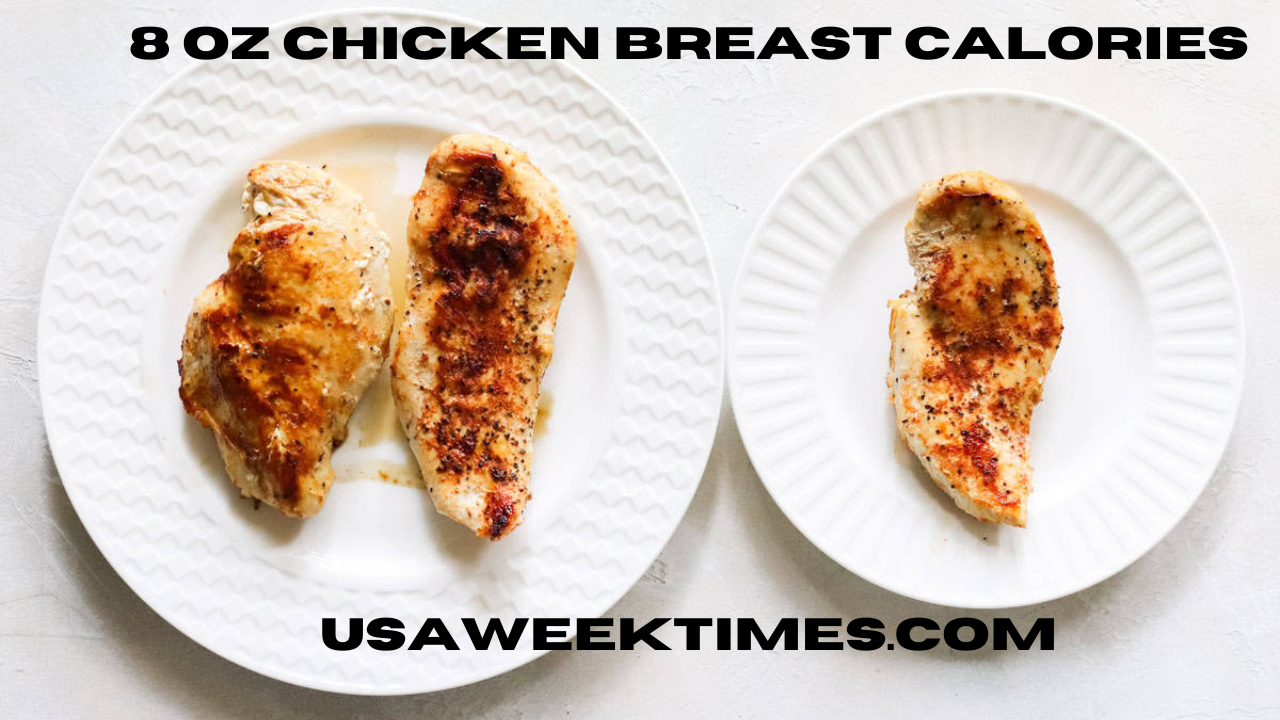8 oz Chicken Breast Calories: How Many Calories Are in 8 oz of Chicken Breast?
Short Title: 8 oz Chicken Breast Calories Explained
When it comes to maintaining a healthy diet, one of the most important aspects is understanding the nutritional value of the food you’re eating. A staple for many fitness enthusiasts and those looking to maintain a balanced diet is chicken breast. Known for its high protein content and relatively low fat, chicken breast is often a go-to option for anyone looking to stay healthy or build muscle. But just how many calories are there in an 8 oz chicken breast? In this article, we’ll dive into the calories of an 8 oz chicken breast, along with its nutritional breakdown, and explore its role in your overall diet.
What is an 8 oz Chicken Breast?
An 8 oz chicken breast refers to the weight of a boneless, skinless piece of chicken. The 8 oz measurement is equal to about half a pound, or approximately 227 grams. Chicken breast is highly regarded for its lean meat, which is low in fat and rich in protein. For individuals who are focused on weight management, muscle building, or improving their overall health, knowing the nutritional content of an 8 oz chicken breast is essential.
Calories in an 8 oz Chicken Breast: The Breakdown
A typical 8 oz serving of skinless, boneless chicken breast contains approximately 360-400 calories. However, the exact number of calories can vary based on the method of cooking and whether or not any added fats or oils are used. When you prepare the chicken breast without skin and without heavy seasoning or sauces, the calorie content is generally in the lower range of that estimate.
Calories from Protein: Chicken breast is renowned for being a protein powerhouse. A typical 8 oz chicken breast contains around 60-70 grams of protein, which contributes significantly to the total calorie count. Protein contains 4 calories per gram, so if you factor in the protein content alone, an 8 oz chicken breast could provide roughly 240-280 calories from protein.
Calories from Fat: In terms of fat, an 8 oz skinless, boneless chicken breast contains about 7-9 grams of fat, which equates to around 63-81 calories from fat. This is considered a relatively low amount of fat, which is one of the reasons why chicken breast is so popular among individuals looking to lose weight or build lean muscle.
Calories from Carbohydrates: Chicken breast contains virtually no carbohydrates, making it an excellent choice for low-carb and ketogenic diets. With no carbohydrates to speak of, the only significant sources of calories are protein and fat.
Different Cooking Methods and Their Impact on Calories
How you cook chicken breast can significantly impact its total calorie content. The basic cooking methods—grilling, baking, broiling, or sautéing—will not add substantial calories, provided you avoid using excessive oils or fats. However, if you add ingredients like butter, oil, or sauces, the calorie count will increase.
For example:
- Grilled Chicken Breast: If you grill an 8 oz chicken breast without any added fats, it will remain around 360-400 calories.
- Baked Chicken Breast: Baking without added oils or sauces will yield a similar calorie count to grilled chicken.
- Fried Chicken Breast: If the chicken is fried in oil, the calories can increase dramatically. Frying in oil could add anywhere from 100-200 additional calories, depending on the amount and type of oil used.
- Chicken Breast with Sauce or Marinade: If you coat the chicken in a sugary sauce or a high-calorie marinade, this will also increase the calorie count.
To ensure the calorie count remains low, it’s advisable to use methods like grilling, baking, or broiling and avoid excessive use of oils and butter.
Nutritional Benefits of 8 oz Chicken Breast
While the focus here is on the calories in an 8 oz chicken breast, it’s also important to recognize its other nutritional benefits. In addition to being an excellent source of protein, chicken breast also provides several essential vitamins and minerals:
- High-Quality Protein: Chicken breast is one of the best sources of lean protein, which is crucial for muscle growth, repair, and overall body function.
- Low in Fat: As mentioned, chicken breast is low in fat compared to other cuts of chicken, such as thighs or wings. The fat content is mostly unsaturated, which is better for heart health.
- Rich in Niacin: Chicken breast is a good source of niacin (vitamin B3), a B-vitamin that plays a key role in energy metabolism and cellular repair.
- Contains Selenium: Selenium is an essential trace mineral that plays a critical role in metabolism and thyroid function.
- Phosphorus: Chicken breast is also a good source of phosphorus, which supports the formation of bones and teeth, and plays a role in energy production.
For those aiming for weight loss or muscle gain, the high protein and low-fat content of chicken breast make it an ideal food for reaching those goals.
8 oz Chicken Breast in Your Diet: How It Fits
Including an 8 oz chicken breast in your diet is an excellent way to provide your body with quality protein while keeping the calorie count manageable. Whether you are trying to lose weight, build muscle, or simply maintain a healthy lifestyle, chicken breast is versatile enough to be included in a variety of meal plans.
For instance, an 8 oz serving of chicken breast can easily be added to salads, wraps, or stir-fries. It can also be paired with steamed vegetables or quinoa to create a well-balanced meal. By using healthy cooking methods and being mindful of added fats and oils, you can ensure that your meals stay nutritious without piling on unnecessary calories.
Comparing Chicken Breast Calories with Other Protein Sources
When comparing the calories in an 8 oz chicken breast to other common protein sources, it’s clear that chicken breast is a leaner option. Here’s a quick comparison:
- 8 oz Salmon: Contains about 450-500 calories (due to higher fat content).
- 8 oz Beef Steak (sirloin): Around 550-600 calories (higher in fat).
- 8 oz Pork Chop: Approximately 500-600 calories.
As you can see, chicken breast is lower in calories compared to many other meat options, making it an attractive choice for those watching their calorie intake.
Is 8 oz of Chicken Breast Too Much?
The ideal serving size for chicken breast can vary depending on your dietary needs and goals. For most individuals, an 8 oz chicken breast is a reasonable portion size, especially if it is part of a balanced meal that includes vegetables, healthy fats, and carbohydrates. However, if you are following a calorie-restricted diet or if you are trying to lose weight, you may want to adjust your portion sizes to better fit your needs.
For those aiming to build muscle, an 8 oz serving of chicken breast is often recommended as it provides a sufficient amount of protein to support muscle growth and repair. However, always consider your total daily calorie intake and adjust based on your individual goals.
Conclusion: How Many Calories in an 8 oz Chicken Breast?
In summary, an 8 oz chicken breast contains approximately 360-400 calories, depending on how it is cooked. It is a high-protein, low-fat food that can fit well into a variety of dietary plans. Whether you’re trying to lose weight, build muscle, or simply maintain a healthy lifestyle, chicken breast is a nutritious and versatile choice. By using healthy cooking methods and being mindful of any additional ingredients, you can enjoy this lean protein while keeping your calorie intake in check.




